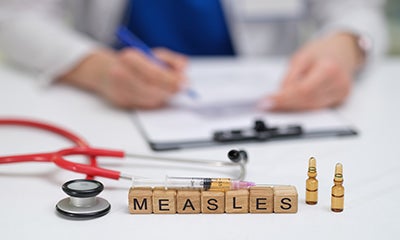Birmingham, Ala. (April 21, 2025)—National Infant Immunization Week begins on April 21. This annual observance highlights the importance of protecting children two years of age and younger from vaccine-preventable diseases. This year, immunizations will be particularly important given the recent measles outbreaks. Dr. Scott James, a pediatric infectious diseases physician at Children’s of Alabama, discusses some common myths about measles.
Myth #1: Measles only affects children.
“Anyone who doesn’t have immunity against measles can be infected, including adults,” says James. “Certain populations are at a higher risk for complications from the infection, such as children under the age of 5, pregnant women, people with weakened immune systems, and older adults.”
Myth #2: Vitamin A prevents or cures measles.
“Vitamin A does not prevent or cure measles,” says James. “The misperception comes from the fact that if a child is diagnosed with measles, Vitamin A deficiency is a known risk factor for worse outcomes, especially in resource-limited settings.”
James added that most children in the United States are not Vitamin A deficient. However, he says if a child gets measles, a pediatrician may recommend Vitamin A as part of supportive management. He warns parents to be careful giving their children Vitamin A on their own because it is easy to overdose, and toxicity can be quite severe.
Myth #3: There are natural ways to prevent measles, so a child does not need a vaccine.
“Measles is extremely contagious,” says James. “It can spread through the air and linger in a room, which means you can get measles by just being in the same room with someone else who is infected. The best protection against measles is the MMR vaccine. Two doses of the vaccine are about 97% effective at preventing measles. No other preventive measures have proven as effective.”
James adds that in the past, measles was under control in the United States. However, recently, there have been outbreaks in several states, and outbreaks have occurred in communities where vaccination rates have fallen. He warns that avoiding measles can be difficult if it is spreading in your community because it is so contagious, which is why it’s important to be immunized as part of the recommended vaccine schedule. Children should be protected with two doses of the MMR vaccine, one at 12-15 months and one at 4-6 years. Children traveling outside the United States or into areas where a measles outbreak occurs can receive the vaccine as early as 6 months.
Myth #4: The measles vaccine causes autism.
“Dozens of high-quality studies all over the world have looked at the question of whether the MMR vaccine causes autism,” says James. “Millions of children have been closely evaluated, and the data is very clear: the MMR vaccine is safe and effective. It is not associated with autism or any developmental delay in any way.”
Myth #5: Measles is a mild infection, so parents don’t have to worry if their child is diagnosed.
“Measles is now a vaccine-preventable disease, but before vaccination was routinely available, measles was a common childhood illness in the United States,” says James. “Thankfully, most children recovered without problems, but many did not. Measles can cause serious health complications, such as dehydration, pneumonia, encephalitis, and even death. Prior to the prevention of measles through routine vaccination, thousands of children in the United States needed to be hospitalized for measles every year.”
Previous stories:
Health experts warn parents about the rise in measles cases | Children's of Alabama







